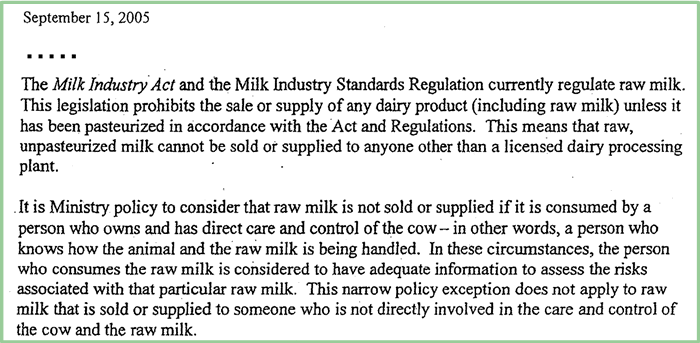Agister: A person who is hired to care for herd animals. To agist is, in English law, to take cattle to graze, in exchange for payment. Agistment originally referred specifically to the proceeds of pasturage in the King’s forests in England (see “The New Forest Agisters” (PDF)). See also “Agistment” in Wikipedia.
Agistment company: A company which a livestock owner group might hire to provide trained, professional agistment services.
“Care and Control Policy”: A B.C. government policy stating that persons having direct care and control of their animals are not considered to be violating laws which forbid the sale and supply of raw milk when they obtain milk from their animals. This except below is from a 2005 letter from the Ministry of Health, stating this policy:

Livestock owner groups (see below) thus often develop procedures that enable members to exercise care and control of their animals. Examples from different active herdshares in B.C. are: members being familiar with their farm’s RAMP and SSOP, reviewing milk sample test results, making decisions regarding buying and selling herd animals, holding membership meetings, watching milking procedures, working or volunteering on the farm, and knowing their animals’ diet and living conditions from regular farm visits.
Farm-fresh, unprocessed milk: Milk which is fresh from the farm, direct to the consumer, without being pasteurized, homogenized, or amended. See our page “Why We Use The Term ‘Farm-Fresh Unprocessed Milk‘” for more details.
Herd-leasing: Legal in some American states, but illegal in Canada, herd-leasing is a “private buying club” operation where a farmer selling dairy products from animals which the farmer owns, to consumers who have bought access to the milk by paying a membership fee. In Canada, the court (R. v. Schmidt 2011 ONCJ 482) ruled that this “approximates membership in a ‘big box’ store that requires a fee to be paid in order to gain access to the products located therein” and therefore involves selling raw milk and is illegal (see “The Tetley Decision” below).
Herdshare (or herd-share): A group of people co-owning one or more herd animals is a herdshare. A herdshare could be a cow-share, goat-share, sheep-share, etc. Herdsharing is not a new idea: American Colonial records show that in 1627, Edward Winslow “sold unto Capt. Myles Standish his sixth share in the red cow,” indicating one cow shared by several families.
Livestock Owners Group: An organized group of consumers who have joint legal ownership of a herd of livestock, formed in order to meet government and legal requirements to ensure that laws forbidding the sale of raw milk are not being broken. Members own the animals, are organized, and make management decisions regarding their animals. Raw milk is not being sold as members already legally own the animals that the products come from. See “A Model for a Legitimate Livestock Owners Group.”
“The LOG Model” – pioneered by a Vancouver Island herdshare, this incorporates Justice Tetley’s legal requirements for herdsharing (see “the Tetley Decision“) and the B.C. Government’s “care and control policy” (above).
Micro-dairy: The formal definition from the Alternative Dairy Initiative (formerly American Micro-Dairies) is “a dairy farm milking 10 or fewer cows, or the equivalent number of sheep, goats (approx 25-50, or other dairy animal.” Generally, a micro-dairy produces less than 50 gallons of milk per day. Most herdshares in B.C. are micro-dairies.
 Mini-dairy: Informally, a dairy farm generally milking more than 10 but fewer than 40 cows, or the equivalent number of sheep, goats, or other dairy animal. B.C. has at least one mini-dairy herdshare.
Mini-dairy: Informally, a dairy farm generally milking more than 10 but fewer than 40 cows, or the equivalent number of sheep, goats, or other dairy animal. B.C. has at least one mini-dairy herdshare.
RAMP: Risk Analysis and Management Plan – an on-farm food safety plan which identifies risks and controls for them. Each farm writes its own RAMP, tailored for its unique conditions.
Share-holder, member, owner, livestock co-owner: Refers to individuals who co-own the animals in the herd and obtain the meat and milk from those animals (and in sheepshares, wool as well). Different herdshares use different terms.
SSOP: Standard Sanitary Operating Procedures – these are written procedures for producing low-risk raw milk for direct consumption. Each farm writes its own SSOP, tailored for its unique conditions.
“The Tetley Decision”: Refers to Justice Peter Tetley’s 2011 judgement detailing (paras. 51-54) that herdshares cannot sell raw milk and must involve:
- A formal contract of purchase-and-sale is executed and legal title is transferred to livestock co-owners.
- Members are involved in the purchase, sale, and replacement of the animals in the herd.
- Members have a say in management of the herd.
- Members have a say in distribution of the resultant products.